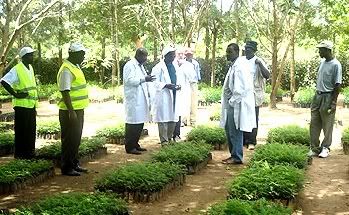Kenya to start biodiesel production from jatropha, yields 10,000 jobs

Speaking at a press conference in Nairobi, Mitsuo Hayashi, chief executive officer of one of Japan's biggest biodiesel producers, Biwako Bio-Laboratory Ltd said the company plans to establish 30,000 hectares (74,000 acres) of oilseed-bearing Jatropha curcas trees, expanding them to 100,000 hectares (247,100 acres) within 10 years. When fully operational, the project will employ some 10,000 workers.
The initial investment, to be spread out over three years, will go into farm inputs and not machinery, which will have a separate capital expenditure and budget.
We have been in the country in the last few days doing a feasibility study and are assured of availability of land and human skills and plans to start operations within the next six months to a year. - MitsuoHayashi, Biwako Bio-Laboratory Inc.The 30,000 hectare plantation will be able to support crude jatropha oil production for the manufacture of 200,000 tonnes of biodiesel per year. The CEO was accompanied by Yoshihisa Ohno, managing director of Japan's, Hydronet Energy Company, with whom they plan to jointly start the Kenyan operation. The team, which has been in the country for the last four days, held talks with several Kenyan Government officials and the private sector on the possibility of setting up the commercial operation.
The Japanese investors will cooperate with the Green Africa Foundation, Kenya's official lead agency responsible for coordinating the development of a viable biodiesel sector. The foundation has been conducting research into jatropha and has its own nurseries. Its focus is on capacity development of poor communities through a partnership approach that integrates environmental conservation and community livelihoods. According to the foundation's chairman, Isaac Kalua, the physical shortages of petrodiesel in Kenya and record prices have led to a winning case for the introduction of biodiesel.
Biodiesel is basically a tree borne oil and the best source of producing biodiesel is Jatropha curcas, a plant that grows well mainly in a tropical climate. We are introducing jatropha curcas as a source of biodiesel in Kenya because it is affordable and environment friendly. - Isaac Kalua, Green Africa FoundationKenya is an energy intensive developing country fully dependent on oil imports, which means it is feeling the devastating effects of high oil prices on all sectors of the economy. Price rises of the current magnitude imply, amongst other effects, a significant reduction of economic growth rates, an erosion of trade balances, rising unemployment, lower import capacity, the destruction of the effects of debt relief efforts, a hike in inflation rates and a blow to agricultural production and marketing (previous post and here).
Competitive biofuels can offset some of these problems. Kenya consumes around 55,000 barrels of oil per day. A single 200,000 tonne per year biodiesel plant would be able to replace slightly more than 5 per cent of this total amount - a significant proportion.
Kenya is a largely agrarian society, with 75 percent of its population employed in the farming sector, mostly as subsistence farmers. Even though one of Africa's medium-sized countries, and certainly not one of the future 'biofuel superpowers' found on the continent, Kenya has an abundance of potential arable land, estimated to be around 15.8 million hectares, of which it currently utilizes around 33 per cent:
 energy :: sustainability :: biomass :: bioenergy :: biofuels :: biodiesel :: jatropha :: energy security :: rural development :: Kenya ::
energy :: sustainability :: biomass :: bioenergy :: biofuels :: biodiesel :: jatropha :: energy security :: rural development :: Kenya :: The Japanese investors have discussed their project with the Ministries of Agriculture, Energy and Regional Development, with the Kenya Investment Authority, TechnoServe Kenya, KenGen and the Green Africa Foundation. Kenya currently grows less than 5,000 hectares of the jatropha tree, which is not enough to support commercial production of the biodiesel.
For this reason, all focus is on establishing energy plantations first. Biwako plans to start with the establishment of tree plantations and will move on to an outgrowers scheme as happens with other major cash crops.

We know neighbouring countries are competing strongly to attract investors in biodiesel production hence we plan to retain a competitive edge over them - Guracha Adi, Kenya Investment AuthorityBiwako, which has operations in Japan, The Philippines, Indonesia and Cambodia, says it is willing to assist Kenya in the formulation of a biodiesel policy and product standards.
Pictures: Kenyan researchers at the Green Africa Foundation's jatropha nursery in Kitui teach community leaders the basics of jatropha cultivation. Credit: Green Africa Foundation.
References:
The Nation - Nairobi (via AllAfrica): Country Ready to Start Producing Biodiesel - November 19, 2007.
The East-African Standard (via AllAfrica): Japanese Firm Gives Sh1.3b for Bio-Fuels - November 19, 2007
Energy Current: Japan to embark on jatropha project in Kenya - November 19, 2007.
Green Africa Foundation: pictures of jatropha nurseries and trees.
 --------------
--------------
 South Korea plans to invest 20 billion won (€14.8/$21.8 million) by 2010 on securing technologies to develop synthetic fuels from biomass, coal and natural gas, as well as biobutanol. 29 private companies, research institutes and universities will join this first stage of the "next-generation clean energy development project" led by South Korea's Ministry of Commerce, Industry and Energy.
South Korea plans to invest 20 billion won (€14.8/$21.8 million) by 2010 on securing technologies to develop synthetic fuels from biomass, coal and natural gas, as well as biobutanol. 29 private companies, research institutes and universities will join this first stage of the "next-generation clean energy development project" led by South Korea's Ministry of Commerce, Industry and Energy.








3 Comments:
I never expect that these plant can produce money.Thank you for these information .These will give the filipino people to plant tuba tuba because this is very useful..Thank you very much.This will prosper me in the future.I may invest for this plantation.
Fuel is very demand in the market and yet we have experiencing fuel problem.Our market right now is implementing the increase of oil price hike.This is the headache of the filipinos. Everytime the fuel will increase our transportation also will increase.Atleast this plant is the substitute .We have to plant tuba tuba.
How much profit do the Japanese investors need to pull off of the top to make this work? Unless the investment is basically a gift, petrol, or even importing coal, will be cheaper.
Post a Comment
Links to this post:
Create a Link
<< Home